Monday, July 22nd, 2024
The options for teeth straightening have significantly expanded, providing patients with more choices to achieve a perfect smile. At Brookmere Dental Group in Coquitlam, we understand the importance of selecting the proper orthodontic treatment for your needs. Two of the most popular options are Invisalign and traditional braces. Both have advantages and disadvantages, and the best choice depends on various factors, including the patient’s lifestyle, the complexity of the dental issue, and personal preferences. In this blog, we’ll focus on the pros and cons of Invisalign and traditional braces to help you make an informed decision.

Invisalign: Invisalign is a modern orthodontic treatment that uses a series of clear, removable aligners to move teeth into their desired positions gradually. These aligners are custom-made for each patient using 3D imaging technology. Patients receive new aligners every one to two weeks, continuously adjusting their teeth.
Traditional Braces: Traditional braces consist of metal brackets bonded to the teeth and connected by wires and elastic bands. The dentist periodically adjusts these wires to move the teeth into place gradually. While metal braces are the most common, there are also ceramic and lingual options, which can be less noticeable.
Our dental clinic in Coquitlam aims to provide personalized care to each patient. When deciding between Invisalign and traditional braces, you must consider your specific dental needs, lifestyle, and personal preferences. Here are some factors to keep in mind:
Both Invisalign and traditional braces have their unique advantages and drawbacks. The choice between the two ultimately depends on individual needs and circumstances. At Brookmere Dental Group, our experienced team is here to help you navigate this decision and find the best orthodontic solution for your smile.
We suggest you schedule a consultation with us to discuss your orthodontic needs and explore the best treatment options available. Together, we can help you achieve the beautiful, healthy smile you deserve.
Saturday, June 29th, 2024
Tooth pain can be one of the most unbearable and debilitating experiences, disrupting daily activities and affecting your overall well-being. At Brookmere Dental Group, we understand how overwhelming this pain can be and are committed to helping our patients in Coquitlam find immediate and effective relief. This blog will explore the various causes of tooth pain, immediate steps you can take for relief, and long-term solutions to ensure your dental health remains optimal.

Tooth pain, or dental pain, can stem from numerous underlying issues. Understanding the cause is crucial in determining the best course of action for relief. Here are some common causes:
When tooth pain strikes, finding immediate relief is often the priority. Here are some steps you can take at home to alleviate the pain temporarily:
While home remedies can provide temporary relief, it is crucial to seek professional dental care to address the underlying cause of the tooth pain. Schedule an appointment with Brookmere Dental Group if you experience any of the following:
At Brookmere Dental Group, our experienced team provides a range of treatments to address the root cause of tooth pain and ensure long-term relief. Here are some common treatments we offer:
Prevention is always better than cure. Here are some tips to help prevent future tooth pain and maintain optimal dental health:
At Brookmere Dental Group in Coquitlam, we provide comprehensive dental care to help our patients achieve and maintain optimal oral health. Coquitlam Dentists’ team of experienced professionals is here to offer personalized care, from preventive services to advanced treatments for tooth pain and other dental issues.
We understand that dental pain can be overwhelming, and we strive to create a comfortable and welcoming environment for all our patients. Our state-of-the-art facility has the latest technology to ensure accurate diagnoses and effective treatments.
Tooth pain can be unbearable, but you don’t have to suffer in silence. By understanding the causes of tooth pain, taking immediate steps for relief, and seeking professional dental care, you can find lasting relief and protect your dental health. At Brookmere Dental Group, dental clinic in Coquitlam we are helping our patients achieve pain-free, healthy smiles. If you are experiencing tooth pain or have concerns about oral health, contact us and schedule an appointment. Your comfort and well-being are our top priorities.
Thursday, June 20th, 2024
Dental crowns and veneers are two popular choices for enhancing your smile. At Brookmere Dental Group, Dental Clinic in Coquitlam, we understand the importance of selecting the right dental treatment to meet your needs. This comprehensive guide will focus on the specifics of dental crowns and veneers, helping you decide which option is best for you.

Dental crowns, often called caps, are restorative dental prosthetics that completely cover a damaged or decayed tooth. They are designed to restore the tooth’s shape, size, and strength and improve its appearance. Crowns can be made from various materials, including porcelain, ceramic, metal, and resin. Each material offers different benefits regarding durability, aesthetics, and cost.
Crowns are known for their strength and can withstand significant chewing forces, making them ideal for molars.
Veneers are thin shells of porcelain or composite resin bonded to the teeth’ front surface. They are primarily used for cosmetic purposes to enhance the appearance of teeth that are discolored, chipped, or slightly misaligned. Veneers are less invasive than crowns and require less removal of the natural tooth structure.
Pros
Pros
Choosing between dental crowns and veneers depends on several factors, including the condition of your teeth, your aesthetic goals, and your budget. Our Coquitlam Dentists provide personalized consultations to help you make the best dental health and appearance decisions.
A thorough consultation with your dentist is crucial in making the right choice. At Brookmere Dental Group, our experienced team will assess your dental health, discuss your goals, and recommend the best treatment plan tailored to your needs. We use advanced technology and materials to ensure optimal results, whether you choose crowns or veneers.
Both dental crowns and veneers offer significant benefits, but they serve different purposes and are suited to other dental issues. At Brookmere Dental Group, we are committed to helping you achieve a healthy, beautiful smile. Whether you need the robust protection of crowns or the cosmetic enhancement of veneers, our expert team is here to guide you through every step.
Contact Brookmere Dental Group today to schedule a consultation if you’re considering dental crowns or veneers. Let us help you find the perfect solution for your smile and ensure you receive the highest quality care tailored to your needs. Your journey to a radiant smile begins with us!
Thursday, May 30th, 2024
A bright, white smile boosts confidence and signifies good oral hygiene. However, tooth discoloration is a common issue affecting many individuals, leading to self-consciousness and concerns about overall dental health. At Brookmere Dental Group, we understand the importance of addressing teeth discoloration comprehensively, from understanding its causes to offering effective solutions. In this blog, we’ll explore the various factors behind tooth discoloration and the solutions available to achieve a brighter, more radiant smile.

Teeth discoloration can occur due to a variety of factors, both intrinsic and extrinsic. Understanding these causes is essential in determining the most appropriate treatment options. Let’s take a closer look at some common reasons for teeth discoloration:
Understanding these underlying causes is crucial in determining the most appropriate treatment approach for teeth discoloration.
Fortunately, several effective solutions are available to address teeth discoloration and restore a bright, white smile. At Brookmere Dental Group, we offer a range of cosmetic dentistry procedures tailored to meet each patient’s unique needs. Here are some common treatments for teeth discoloration:
Teeth discoloration is a common concern that can significantly impact self-confidence and overall dental health. Our Dental Clinic in Coquitlam At Brookmere Dental Group is dedicated to helping our patients achieve brighter, healthier smiles through personalized treatment plans tailored to their unique needs. By understanding the underlying causes of tooth discoloration and offering various effective solutions, we can help you regain confidence in your smile and enjoy the benefits of improved oral health. Don’t let teeth discoloration hold you back – schedule a consultation with our experienced team today and take the first step towards a brighter, more radiant smile!
Saturday, May 18th, 2024
Introduction
Welcome to Brookmere Dental Group’s comprehensive guide on Invisalign treatment. In recent years, Invisalign has revolutionized the field of orthodontics, offering a discreet and convenient alternative to traditional braces. However, despite its growing popularity, many patients still have questions and concerns about the treatment process. In this blog post, we will address some of the most common questions regarding Invisalign, providing you with the information you need to make an informed decision about your orthodontic care.

Invisalign is a modern orthodontic treatment that uses a series of clear, removable aligners to straighten teeth gradually. These aligners are custom-made to fit snugly over your teeth, and pressure is gently applied to move them into the desired position. Unlike traditional braces, Invisalign aligners are virtually invisible, making them a popular choice for individuals who want to improve their smile without drawing attention to their orthodontic treatment.
The Invisalign treatment process begins with a consultation with your dentist or orthodontist. During this appointment, your dental professional will assess your oral health and discuss your treatment goals to determine if Invisalign is right for you. If Invisalign is deemed suitable, digital impressions or physical molds of your teeth will be taken to create your custom aligners.
Once your aligners are ready, you will wear each set for about two weeks, gradually progressing to the next set as your teeth align. Throughout the treatment process, you will visit your dentist periodically to monitor your progress and receive new aligners. On average, Invisalign treatment takes about 12 to 18 months, although this timeline can vary depending on the complexity of your case.
While Invisalign is an effective treatment for many orthodontic issues, it may not suit everyone. Invisalign is best suited for mild to moderate misalignment, crowding, and spacing issues. Severe orthodontic problems may require traditional braces or other specialized treatments.
Additionally, Invisalign may not be recommended for young children with still developing teeth. However, teenagers and adults of all ages can benefit from Invisalign treatment, provided they are committed to wearing their aligners as directed by their dental professional.
There are several benefits to choosing Invisalign over traditional braces:
Proper care and maintenance of your Invisalign aligners are essential for ensuring optimal results and oral hygiene. Here are some tips for caring for your aligners:
One significant advantage of Invisalign is that you can eat and drink most foods and beverages without restrictions. However, removing your aligners before eating or drinking anything other than water is important to prevent damage and staining. Be sure to brush your teeth before reinserting your aligners to maintain good oral hygiene throughout treatment.
Invisalign is designed to fit seamlessly into your lifestyle, allowing you to enjoy your favorite activities with minimal disruption. Whether playing sports, attending social events, or giving presentations at work, Invisalign aligners offer the flexibility and convenience you need to live life to the fullest.
Invisalign treatment offers a discreet, comfortable, and convenient way to achieve the smile of your dreams. By addressing common questions and concerns about Invisalign, we hope to provide you with the information you need to make an informed decision about your orthodontic care. If you want to learn more about Invisalign or schedule a consultation, contact Brookmere Dental Group, our dental clinic Coquitlam today. Let us help you achieve the confident, beautiful smile you deserve.
Tuesday, April 30th, 2024
Introduction
When it comes to dental health, prevention is essential. Regular dental check-ups, good oral hygiene, and a healthy diet can help maintain oral health. However, there are times when unexpected dental issues arise, requiring immediate attention from a professional. Ignoring these symptoms can lead to further complications and discomfort. In this blog post, we’ll discuss some signs that indicate you need emergency dental care, emphasizing the importance of not ignoring these symptoms. As we explore this topic, Brookmere Dental Group is your trusted dental clinic in Coquitlam, where we prioritize your dental health and well-being above all else.
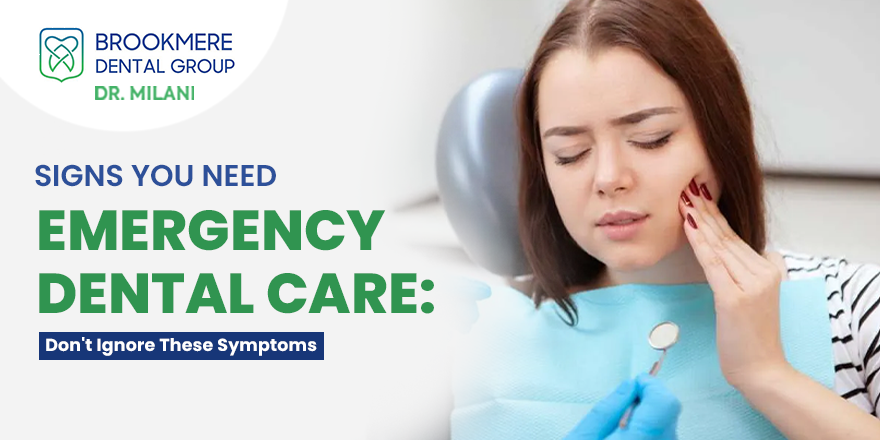
Tooth pain can range from mild discomfort to excruciating agony. While occasional tooth sensitivity or minor pain may not warrant emergency care, persistent and severe tooth pain could indicate a serious issue such as an infection or abscess. Ignoring persistent tooth pain can lead to further complications, including spreading the disease to surrounding teeth and tissues. If you’re experiencing relentless tooth pain, seeking emergency dental care promptly to address the underlying cause and alleviate your discomfort is crucial.
Swelling and inflammation in the gums, face, or jaw can indicate various dental problems, such as gum disease, infection, or an abscessed tooth. In some cases, swelling may accompany severe tooth pain or difficulty opening the mouth. Ignoring swelling and inflammation can exacerbate the underlying issue, potentially leading to severe complications. Prompt evaluation by a dental professional, such as Coquitlam Dentist at Brookmere Dental Group, can help diagnose the problem and prevent it from worsening.
While minor bleeding during brushing or flossing is relatively common, persistent or excessive bleeding from the gums could signal an underlying problem such as gum disease or trauma. Ignoring bleeding gums may result in the progression of gum disease, leading to gum recession, tooth loss, and even systemic health issues. Suppose you notice persistent bleeding from your gums, especially if accompanied by other symptoms such as swelling or pain. In that case, it’s essential to seek emergency dental care for proper evaluation and treatment.
Trauma or injury to the mouth can cause a tooth to become loose or completely knocked out. Immediate action is crucial to maximize the chances of saving the tooth. If a tooth becomes loose due to trauma or injury, avoid wiggling or touching it unnecessarily and immediately seek emergency dental care. Similarly, if a tooth gets knocked out, handle it carefully by the crown (top part), rinse it gently with dirty water, and try to reinsert it into the socket if possible. If reinsertion isn’t feasible, place the tooth in a container of milk or saliva and get to your dentist immediately for emergency treatment.
Chronic bad breath, or halitosis, can be embarrassing and may indicate an underlying dental issue such as gum disease, tooth decay, or oral infection. Similarly, an unpleasant taste in the mouth that persists despite oral hygiene practices could be a sign of dental problems. Ignoring persistent bad breath or an unpleasant taste may allow the underlying issue to progress, leading to more significant oral health issues. Seeking emergency dental care can help diagnose and address the root cause of these symptoms, restoring your oral health and confidence.
When faced with a dental emergency, choosing the right dental clinic can make all the difference in receiving prompt, effective care and restoring your oral health. Here are compelling reasons why you should trust Brookmere Dental Group for your emergency dentistry needs in Coquitlam:
At Brookmere Dental Group, we take pride in our team of experienced and skilled dental professionals committed to providing exceptional emergency dental care. Our dentists have undergone extensive training and possess the expertise to handle a wide range of dental emergencies with precision and compassion.
Our dental clinic is equipped with state-of-the-art facilities and advanced technology to ensure our patients receive the highest standard of care. From digital X-rays and intraoral cameras to modern treatment techniques, we utilize cutting-edge tools and equipment to diagnose and treat dental emergencies efficiently.
Whether you’re experiencing severe tooth pain, swelling, a knocked-out tooth, or any other dental emergency, our team at Brookmere Dental Group is here to help. We offer comprehensive emergency dental services to address various dental issues promptly, providing you with the relief and care you need when you need it most.
At Brookmere Dental Group, we prioritize the comfort and well-being of our patients above all else. From the moment you walk through our doors, our friendly staff will greet you with warmth and empathy. We understand that dental emergencies can be stressful, so we strive to create a supportive and welcoming environment where you can feel at ease during your visit.
At Brookmere Dental Group, we are committed to excellence in everything we do. Whether providing emergency dental care, preventive services, or cosmetic treatments, we are dedicated to delivering outstanding results and exceeding our patients’ expectations. When you choose Brookmere Dental Group for emergency dentistry needs, you can trust that you’re in good hands.
Your oral health is integral to your overall well-being, and recognizing the signs that indicate you need emergency dental care is crucial for maintaining optimal oral health. From persistent tooth pain and swelling to bleeding gums and loose teeth, ignoring these symptoms can lead to severe complications and discomfort. At Brookmere Dental Group in Coquitlam, we understand the importance of prompt and effective dental care, so we’re dedicated to providing emergency dental services to address your needs when they arise. Remember, don’t ignore the signs—seek emergency dental care promptly to safeguard your oral health and preserve your beautiful smile.
Thursday, April 18th, 2024
Introduction:
In restorative dentistry, dental implants and bridges are two widely used options for replacing missing teeth. At Brookmere Dental Group, we understand the significance of restoring dental health and aesthetics for our patients. In this comprehensive guide, we read the differences between dental implants and bridges to help you decide which option suits your needs best.
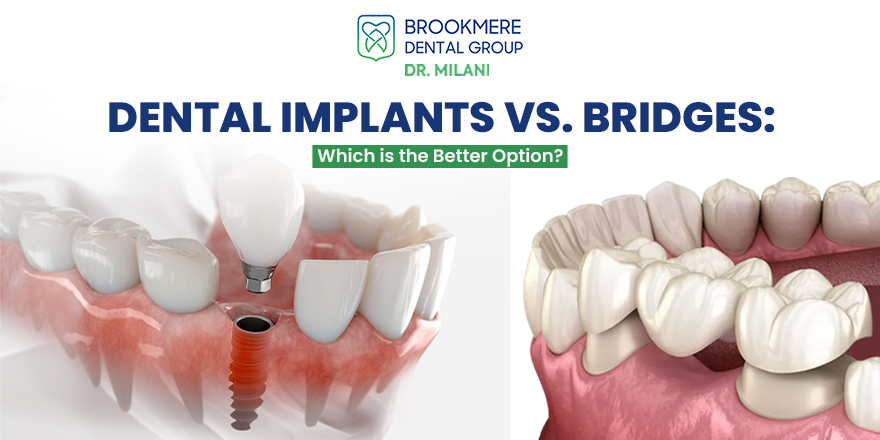
Dental implants are an extreme form of dentistry, offering a solution for replacing missing teeth. They consist of three main components: the implant fixture, abutment, and prosthetic crown. The implant fixture, typically made of titanium, is surgically placed into the jawbone, where it fuses with the bone through a process called osseointegration. This provides a sturdy foundation for the prosthetic tooth.
Dental bridges, also known as fixed partial dentures, are another standard solution for replacing missing teeth. They consist of one or more artificial teeth anchored in place by dental crowns on adjacent natural teeth or implants.
Procedure Complexity: Implant placement involves surgery and a more extended treatment timeline, whereas getting a bridge is a more straightforward procedure with faster results.
Our Dental Clinic in Coquitlam at Brookmere Dental Group, we recognize that every patient is unique, and there is no one-size-fits-all solution when it comes to restorative dentistry. Both dental implants and bridges offer distinct advantages and considerations. During a complete consultation, our experienced team will evaluate your oral health, discuss your treatment goals, and help you determine which option best fits your needs and preferences. Whether you opt for the permanence of dental implants or the convenience of dental bridges, rest assured that you’re in capable hands at Brookmere Dental Group, where your smile is our priority.
Thursday, March 28th, 2024
Two standard procedures in dental health often come into play when dealing with severe tooth decay or damage: root canal therapy and tooth extraction. These procedures may seem daunting, but understanding their differences and knowing when each is appropriate can significantly benefit your oral health in the long run. This complete guide will delve into the intricacies of root canal therapy and tooth extraction to help you make informed decisions about your dental care.
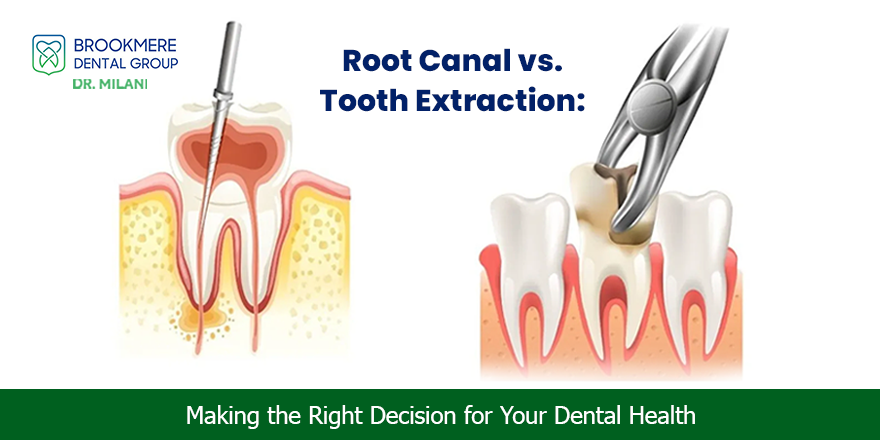
At Brookmere Dental Group, located in Coquitlam, we understand the importance of personalized dental care tailored to each patient’s needs. Our team of experienced dentists is committed to providing compassionate and comprehensive dental services to help our patients achieve optimal oral health and beautiful smiles. Whether you’re considering a root canal or tooth extraction, our skilled professionals are here to guide you through the process with care and expertise.
Root canal therapy, often called a root canal, is a dental procedure to save a severely damaged or infected tooth. Contrary to popular belief, root canals are not inherently painful; they are performed to alleviate the intense pain caused by an infected or inflamed tooth pulp.
During a root canal procedure, the dentist removes the infected or damaged pulp inside the tooth, cleanses the root canals, and seals them to prevent further infection. This process effectively preserves the natural tooth structure while eliminating the source of pain and disease. Following the root canal, a crown or filling is typically placed over the treated tooth to restore its strength and functionality.
Root canal therapy is typically recommended in the following situations:
Tooth extraction involves removing a damaged or infected tooth from its socket in the jawbone. While it may seem like a drastic measure, it is sometimes necessary to prevent the spread of infection or address irreparable damage to the tooth.
There are two types of tooth extractions:
While tooth extraction may seem like a last resort, it can offer several benefits in certain circumstances:
Tooth extraction may be recommended in the following situations:
When faced with choosing root canal therapy and tooth extraction, it’s essential to consult your dentist to determine the most appropriate course of action for your situation. Factors such as the extent of damage, the location of the affected tooth, and your overall oral health will influence the decision-making process.
At Brookmere Dental Group, our experienced dentists will carefully evaluate your dental condition, discuss your treatment options, and help you make an informed decision that aligns with your goals and preferences. Whether you require a root canal, tooth extraction, or any other dental procedure, you can trust our team to provide personalized care and support every step of the way.
Root canal therapy and tooth extraction are valuable tools in modern dentistry’s arsenal. Each serves a distinct purpose in preserving oral health and restoring functionality. By understanding the differences between these procedures and consulting with your dentist, you can make confident decisions about your dental care that promote long-term wellness and vitality.
At Brookmere Dental Group, your trusted Coquitlam dentists, we are dedicated to delivering exceptional dental care in a warm and welcoming environment. Whether you need root canal therapy, tooth extraction, or any other dental service, we are here to serve you with compassion, expertise, and personalized attention.
Schedule an appointment today and take the first step toward a healthier, happier smile.
Thursday, March 21st, 2024
Introduction
Maintaining optimal oral health is essential for individuals and families alike. From children to seniors, everyone is sensitive to dental issues that can impact their overall well-being. Understanding these common dental problems and implementing preventive measures is crucial for promoting healthy smiles and preventing unnecessary discomfort and expenses. At Brookmere Dental Group, a dental clinic in Coquitlam, we are committed to providing comprehensive dental care to families, ensuring they enjoy solid and healthy teeth for years to come.
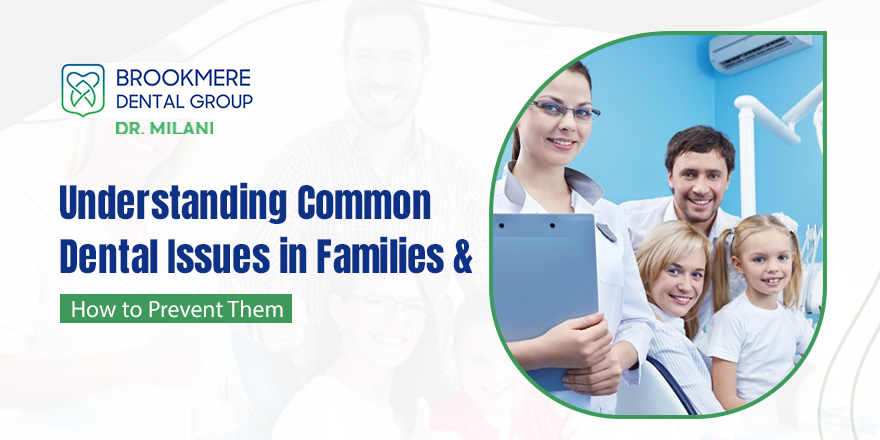
Brookmere Dental Group is a leading dental clinic serving the Coquitlam community and beyond. Our team of experienced dentists, hygienists, and staff prioritizes patient comfort and satisfaction while delivering top-quality dental services. Our clinic is equipped with state-of-the-art facilities and technology, enabling us to offer a wide range of treatments and procedures tailored to each patient’s unique needs.
At Brookmere Dental Group, we believe in preventive dentistry as the cornerstone of oral health. We aim to empower individuals and families to take control of their dental well-being through regular check-ups, cleanings, and patient education. Whether you require routine care, restorative treatments, or cosmetic enhancements, our dedicated team ensures you receive the highest standard of care in a warm and welcoming environment.
Dental caries, commonly known as tooth decay, is one of the most prevalent dental problems affecting individuals of all ages. It occurs when bacteria in the mouth produce acids that erode the enamel, leading to cavities. Poor oral hygiene, sugary foods and beverages, and inadequate fluoride exposure are primary contributors to tooth decay.
Prevention:
Gum disease encompasses a range of conditions affecting the gums and supporting structures of the teeth. Gingivitis is the earliest stage, characterized by inflammation and bleeding of the gums. Without proper intervention, gingivitis can progress to periodontitis, a more severe form of gum disease that can lead to tooth loss and systemic health complications.
Prevention:
Accidents or injuries to the mouth can result in dental trauma, such as chipped, cracked, or knocked-out teeth. Sports-related injuries, falls, and vehicle accidents are common causes of dental trauma, particularly among children and adolescents.
Prevention:
Malocclusion refers to misalignment or irregular positioning of the teeth, which can affect bite function and oral aesthetics. Common types of malocclusion include overcrowding, overbites, underbites, and crossbites. Genetics, childhood habits, and facial trauma can contribute to the development of malocclusion.
Prevention:
Oral cancer is a serious and potentially life-threatening condition characterized by the abnormal growth of cells in the oral cavity, including the lips, tongue, cheeks, and throat. Tobacco use, excessive alcohol consumption, and human papillomavirus (HPV) infection are significant risk factors for oral cancer.
Prevention:
Understanding the common dental issues that affect families and implementing preventive measures are essential for maintaining optimal oral health and overall well-being. By partnering with a trusted dental provider like Brookmere Dental Group, families can receive personalized care and guidance to address their unique dental needs. Through education, early intervention, and regular dental visits, individuals of all ages can enjoy healthy smiles that last a lifetime.
Schedule your appointment with us today at dental clinic Coquitlam and embark on the journey to a healthier, happier smile!
Thursday, February 29th, 2024
Introduction
A radiant smile is a symbol of confidence and well-being. However, tooth loss can have a profound impact on both oral health and self-esteem. In recent years, dental implants have emerged as a revolutionary solution, offering a natural-looking way to restore a complete and functional smile. At Brookmere Dental Group, we understand the importance of a healthy and beautiful smile, and our team of skilled professionals is dedicated to providing top-notch dental implant services. In this comprehensive guide, we will explore the world of dental implants, shedding light on their benefits, the implantation process, and why Brookmere Dental Group stands out as a trusted partner in your journey to a restored and confident smile.
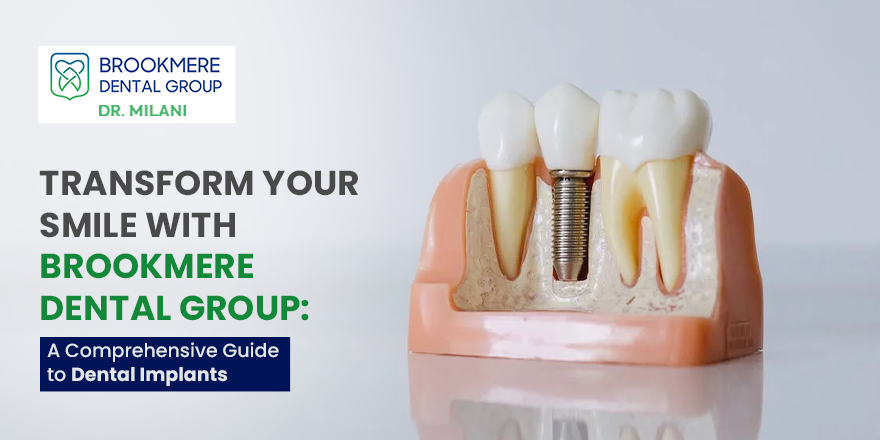
Dental implants are prosthetic teeth surgically arrived at the jawbone, mimicking the natural structure of a tooth. Composed of three essential components – the implant, abutment, and crown – dental implants provide a long-term and aesthetically pleasing solution to tooth loss.
At Brookmere Dental Group, we prioritize patient comfort and satisfaction throughout the dental implant process. Our team of experienced and skilled professionals follows a comprehensive approach to ensure successful implantation and optimal results.
Dental implants have revolutionized dentistry, offering a permanent and natural-looking solution to tooth loss. At our dental clinic in Coquitlam, our commitment to excellence and patient satisfaction sets us apart as a trusted partner in your journey to a restored and confident smile. If you are considering dental implants, schedule a consultation with our experienced team to explore how we can transform your smile and enhance your oral health. Rediscover the joy of smiling with Brookmere Dental Group – your partner in dental excellence.
